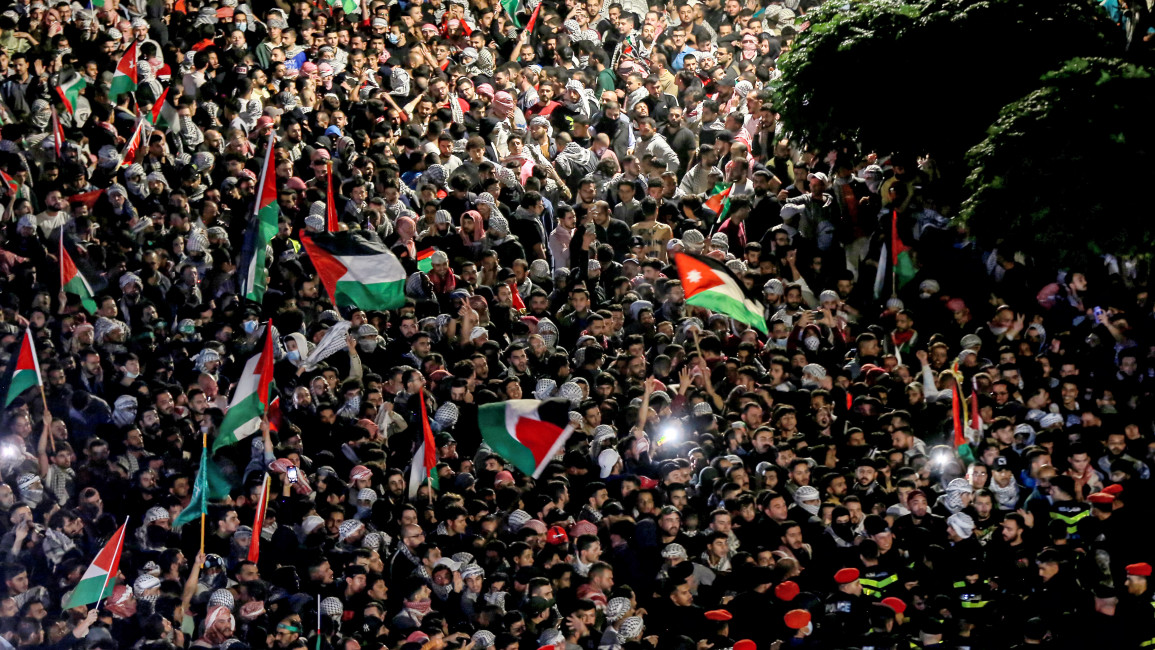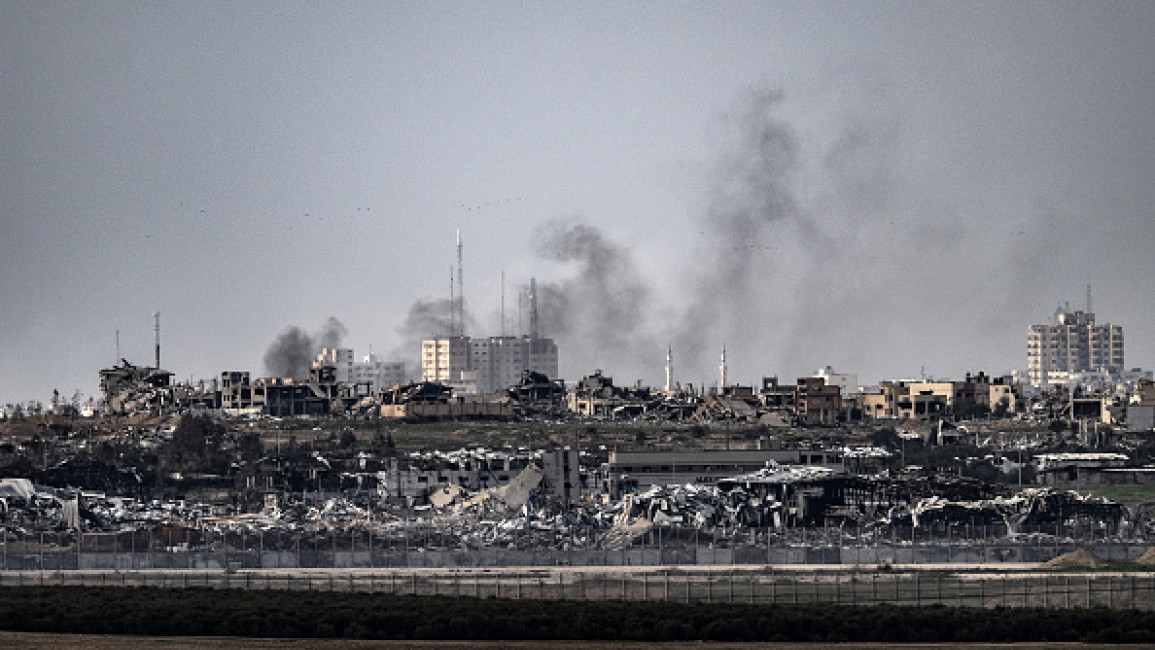
Could Jordan become a new battleground in US-Iran tensions?

From the empty expanse of the desert, one of Jordan’s worst nightmares unfolded: the death of US troops on its soil.
On 28 January, an attack drone infiltrated the darkness surrounding an isolated US outpost along Jordan’s border with Syria, known as Tower 22.
The drone crept past the advanced American air defence systems, killing three US soldiers and wounding dozens more - marking a brazen escalation in the already simmering region.
The Islamic Resistance in Iraq, an umbrella group of Iran-linked militias including Kataib Hezbollah and Harakat Hezbollah al-Nujaba, has claimed responsibility for the attack and named Israel’s offensive in Gaza as its reason.
"There is a real desire from these militias to make Jordan a place where they can operate, can create hotspots, and can attack Western and American interests"
In recent years, Iranian-backed militias have grown increasingly bold on the Jordan-Syria border, particularly surrounding Tower 22 in Jordan, near the US’s al-Tanf Garrison, just a step over the border in Syria.
The latest strike within Jordan’s borders was “certainly a significant escalation”, Merissa Khurma, an analyst with the Wilson Center, told The New Arab. “The primary goal was to attack the US’s presence, but it was also to send a message to Jordan,” Khurma said.
The attack was the first in Jordan since the war in Gaza. The Kingdom, with strong US and Western ties, has long been seen as a beacon of stability.
The US base intercepts the strategic Baghdad-Damascus highway, which Iranian-backed groups have long sought to control for their lucrative weapons and drugs trade. As the Jordanian military has attempted to deter the illicit trade it has been dragged into increasingly violent and deadly confrontations with Tehran’s proxies.
“They are using the drug trade as a tool to weaken Jordan,” Abdullah Hayek, a Washington-based Jordanian analyst specialised in Iranian-backed militias, told TNA.
In four of Jordan’s neighbouring countries - Lebanon, Syria, Iraq, and Yemen – Iranian-backed groups have expanded their influence. These militias, especially in Iraq, often compete for power according to their domestic interests and are not necessarily dictated to by Iran.
“They want Jordan to be the next domino piece,” Hayek said.
|
|
Anger at the US military presence in Jordan
Meanwhile, the Jordanian public is outraged over the ongoing atrocities committed by Israel as the war in Gaza enters its fourth month - with anger largely directed at Israel’s largest military financier, the US.
The US supplies Israel with over $3.8 billion of military aid yearly and has pledged billions more since Israel launched its air and ground assault into Gaza, which has killed over 27,000 Palestinian men, women, and children. The majority, or around 60%, of Jordanians are of Palestinian origin.
“America is providing complete cover for the Zionist entity [Israel] as it defends its war crimes and crimes against humanity,” said Murad Adaileh, the secretary general for the Islamic Action Front (IAF), the political wing of the Muslim Brotherhood in Jordan and the country’s largest opposition group.
The popularity of more anti-US groups in Jordan, like the Muslim Brotherhood, has increased as anti-Western sentiment has reached unprecedented levels.
"While the Kingdom's condemnation of Israel's genocide in Gaza has been made loud and clear, Jordan is still officially an Israeli peace partner and depends on a hefty package of US military and economic assistance"
Amid Washington’s unwavering support for Israel in Gaza and following the recent drone strike on Jordanian soil, Jordanian parliamentarians are calling to review the US military presence in the country.
“Jordanians reject the American military presence in Jordan,” Adaileh told TNA. “The presence of the Americans is a burden on the Jordanian state and people.”
While the Kingdom’s condemnation of Israel’s genocide in Gaza has been made loud and clear, Jordan is still officially an Israeli peace partner and depends on a hefty package of American military and economic assistance.
The 1994 Israel-Jordan peace treaty opened the floodgates for US economic and military assistance to Jordan. Since then, US financing has increased incrementally and so too has joint military training and intelligence sharing.
In 2021, Jordan signed a defence agreement with the US that allows for the free entry of US forces, aircraft, and vehicles into the Kingdom’s territory for “training and counter-terror cooperation”, and in return, the Kingdom would receive $425 million per year in military aid.
However, in an exceptional move, the deal bypassed the parliament and went into effect through a royal decree.
The US military agreements are “a violation to the constitution and Jordanian laws,” Adaileh stated. “The presence of these [US] bases could cause problems for Jordan with Arab and Islamic countries,” he added, noting that tensions escalate when US forces “begin to attack Arab countries and the Arab and Islamic peoples”.
Media reports have circulated of Jordan’s participation in US airstrikes in Iraq on 2 February in retaliation for the attack on US troops in Jordan. Despite Amman denying having participated, an Iraqi parliamentarian proposed cutting off subsidised oil exports to Jordan.
The Biden administration, meanwhile, has vowed to continue its military actions targeting Iranian-backed groups, noting its recent strikes on Houthi targets in Yemen and militias in Iraq and Syria were “just the beginning” of their response.
On Wednesday, a US drone strike in Baghdad killed a Kataib Hezbollah commander said to have been responsible for attacks on US forces in the region.
|
|
Jordan's 'new geography'
The recent drone attack on Jordanian soil was a signal of the Iran-backed militias' expansion of operations to “a new geography” in the war in Gaza, past Syria and Iraq, and now into Jordan, Jordanian analyst Amer Sabaileh told TNA.
“There is a real desire from these militias to make Jordan a place where they can operate, can create hotspots, and can attack Western and American interests,” he said.
“Jordan is strategically the most important geography today in the Middle East. It is a place where you can have a proxy war with Western countries by targeting the stability of Jordan.”
Around 2020, Iran, in cooperation with the Syrian regime, began to facilitate the production and trade of the amphetamine-type drug captagon around Jordan’s borders, analyst Hayek said.
"Analysts say the recent drone attack on Jordanian soil was a signal of Iranian-backed militias' expansion of operations to a new geography"
In recent months during the war in Gaza, the drug trade has significantly intensified on Jordan’s northern borders, with a rise in weapons seizures, a diversification of smuggling methods, and an incorporation of more advanced weaponry, including rocket-propelled grenades, mines, and drones.
“This is all a method by Iran to put Jordan in a very delicate situation, diplomatically and internationally,” Hayek stated.
The drone attack was Iran’s way of “trying to play this infiltration in Jordan very delicately”, he added, hence why militias attacked hundreds of kilometres away from any major civilian centre.
In December, Jordan’s armed forces (JAF) were engaged in some of its heaviest fighting with traffickers on the border. A JAF statement noted the escalation of border incidents from “mere infiltration and smuggling attempts to aggressive armed engagement that aim at forcefully breaching the border”.
Jordan retaliated to the border confrontations with consecutive airstrikes targeting suspected farms and hideouts of the drug smugglers in southern Syria in early January.
Katrina Sammour, a Jordan-based analyst, said in the latest confrontation on the Kingdom’s northern border on 18 December that Jordanian forces battled a nearly 400-large drug trafficking group for 14 hours, and afterwards confiscated heavy weapons and explosives.
She pointed to the huge national security threats the drug trade has presented for Jordan, especially as the Kingdom has become not just a transit route, but also a growing market for the highly addictive drugs and a recruitment base for the network.
Sammour added that Iran has taken advantage of the war in Gaza to “shift its messaging to try and link the criminal activity to the resistance”. For instance, she said the Iran-backed groups have falsely claimed the weapons being smuggled were for Palestinian resistance groups.
“This is one way Iran is trying to soften its hegemony and dilute itself within the Arab street.”
|
|
Since the war in Gaza, pro-Iran militias in Iraq and Syria have also reportedly launched three drone attacks through Jordanian airspace en route to Israel.
The use of Jordanian airspace and land borders for the passage of weapons and drones puts Amman in a delicate position with the US and Israel as it balances a public vehemently opposed to Tel Aviv’s war and Washington’s military presence in the country with security obligations spelled out in the 1994 peace treaty.
“Iran wants to make sure Jordan is viewed as unreliable and vulnerable in the eyes of the US and the West. They want to cut the public, diplomatic, economic, and military relations between Jordan and its traditional allies,” Hayek said.
While calls have grown in some quarters to review the US military presence in Jordan, a senior former government official told TNA that it is highly unlikely Amman would cancel its defence agreements with the US.
In late October, Jordan asked Washington to deploy its Patriot missile defence system on the country’s borders to bolster security amid fears of the Gaza war spreading.
The drone attack on US forces by Iranian-backed militias, however, has “opened an eye to the risks countries like Jordan might face”, analyst Sabaileh said.
Hanna Davis is a freelance journalist reporting on politics, foreign policy, and humanitarian affairs.
Follow her on Twitter: @hannadavis341




![Minnesota Tim Walz is working to court Muslim voters. [Getty]](/sites/default/files/styles/image_684x385/public/2169747529.jpeg?h=a5f2f23a&itok=b63Wif2V)






